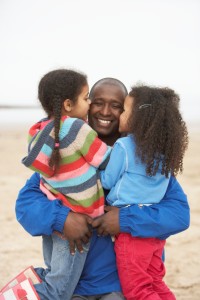
Children under the age of seven are in a developmental period for creating social relationships. Children want to connect and develop bonds of trust, respect and love with the people around them. Children are designed to want to connect positively with the adults in their lives. Children are naturally motivated to love.
Unfortunately, the dynamics of relationship building for the child can be thwarted by obstacles created by the adults in the child’s world.
When children hit stumbling blocks to positive engagement, we may witness defiant behaviors, tantrums and discouragement in the child.
When a child cannot constructively engage with parents or other adults in his or her life, we may see the child act disobediently to get attention. If not redirected in a positive manner, the child may learn to ignore adults and become passive, resistant or ambivalent about these relationships.
The child’s innate tendency is to be involved in purposeful activity to help others. When a child is concentrated on an activity with positive connections to the people around him or her, we observe a happy and joyful child.
When we see a child behave in a way that is not constructive, we are almost assured that the child has lost a necessary and vital connection to the adults in his or her life. An unhappy child gives us a clue that the child has an impediment to an essential adult relationship.
When a child loses this supportive connection to adults, the child’s motivation and behavior is ruled by fear; fear of losing love and fear of losing the adults in his or her life. What we perceive as misbehavior is a child’s cry for help and love.
If our efforts to connect to the child are not based on love and genuine concern, and instead are based on our own fears, such as our children being an embarrassment to us, we will not be able to reconnect and use the inborn positive psychology of the child.
Our yelling, our punishing or our using natural or logical consequences to try to change behavior should be a signal to us to change our behavior. When we find ourselves choosing to ‘do to’ our children instead of ‘working with’ our children, we need to realize we have lost contact with our children’s love, respect and trust.
When a child feels disconnected to his or her parents the child goes through three stages of emotional reactions:
- First is protest, in which the child cries and refuses to be consoled by others.
- Second is despair, in which the child is sad and passive.
- Third is detachment, in which the child actively disregards the parent.
To reconnect to the positive psychology of the child, we must strive to see the child’s innate love, respect and trust for others, and how those qualities motivate behavior.
We must consider what actions, words or physical barriers keep the child from expressing or experiencing our love. We need to watch for situations that create emotional reactions in the child of protest, passivity or disregard. A misbehaving child is a discouraged child who does not feel joined to the ones he or she loves.
Do we respect the child’s efforts and rights? We need to listen to our children and take their point of view seriously and respectfully. Respect can help us reconnect.
Do we act in such a manner to always instill trust in our relationship with the child? We need to encourage our children to talk to us so that we will know what we are doing right, where we need to improve, and how we might change. Even a two-year-old can give us valuable feedback on how our actions are, or are not, establishing a trusting relationship.
Children are designed to want to connect in a constructive loving way. Children’s behavior lets us know if they feel connected to us or not. Use the child’s innate positive psychology to create a lifelong bond of love, trust and respect.

Your articles are the most insightful and expertly written without sounding too academic! I enjoy and value your articles and often pass them on to the parents in my Montessori School! Thank you!
Hannelore,
Thank you!
Very helpful, thank you.
Faiza,
You are always welcomed.
Thank you for the article. I’m reading it thinking, “That is my 7 year old’s behavior,” but I’m still left wondering what to actually do to make things better. The article suggests I need to do more to “respect my child’s efforts and rights” and to “instill trust,” but I don’t know how to do that, and I’m not sure how I’m not currently doing that. Can you please give some common examples of parental behavior that undermines this and alternative ways of going about it?
Thank you.
Nicole,
Our biggest job as parents, I think, is to listen to our children.
And it is not easy to do!
Our children from about the ages 6 to 12 are in a period of development where they want to break out into the larger community.
In short, they demand more freedom.
There is a Kids Talk series of article, An Iron Hand In A Velvet Glove,where I talk about how to be kind and firm while listening to children.
You can read it here:
http://marenschmidt.com/tag/iron-hand-in-a-velvet-glove/
Also, I did a five part video lesson on the child’s need to belong:
http://marenschmidt.com/tag/childs-need-to-belong/
That series may be helpful too. These video lessons are also in my free course, See It In Your Child. Sign up below:
http://marenschmidt.com/workshops/live-monthly-q-and-a/
Hope that helps.
Please let me know how it goes.
I did like the suggestion made. Please do send the free videos to learn. Thanks
Narasimha,
To watch the five-part video series please click through below:
http://marenschmidt.com/tag/childs-need-to-belong/
Hint: Check the dates. The first is last in the line-up.